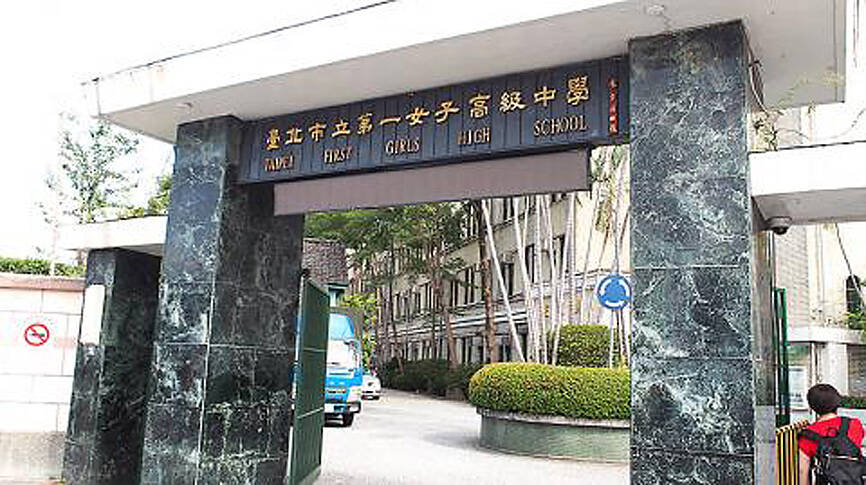The Taipei First Girls High School (TFG) has banned its teachers from participating in interviews with Chinese state media after one instructor sparked an outcry by criticizing President William Lai (賴清德) on China Central Television (CCTV).
In an announcement to staff and students Monday, Principal Chen Chih-yuan (陳智源) said TFG maintains a "free and democratic" campus environment, tolerating and respecting a diverse range of viewpoints as long as they don’t violate school rules.
"However, in light of the current cross-strait tensions, and to avoid creating unnecessary troubles, [TFG] will prohibit teachers from accepting interviews with state media of the People’s Republic of China (such as CCTV) with immediate effect," the statement said.

Photo: Tsai Ya-hua, Taipei Times
As of last night, Chen had also set his Facebook account to private, and a TFG official said the school did not wish to comment on the issue.
The controversy arose last week after the Taipei Department of Education received complaints about comments that TFG teacher Ou Kui-chih (區桂芝) made during an appearance on Chinese national broadcaster CCTV.
During an interview, Ou criticized Lai’s move to designate China as a "hostile foreign force," saying she didn’t know how she could face her Chinese relatives.
Ou, who teaches Chinese literature, previously made headlines in 2023 when she slammed new government curriculum guidelines that cut the number of classical Chinese texts as politically motivated "desinicization" and "a crime deserving more than 10,000 deaths."
Following Ou’s comments, the Taipei Department of Education said it would allow the school to handle the matter internally, adding that it respects teachers’ professional autonomy and freedom of speech as long as they uphold the principle of educational neutrality.
Minister of Education Cheng Ying-yao (鄭英耀) said last week that while he respects teachers’ freedom of expression, they should also maintain a clear sense of national consciousness and identity.

‘DENIAL DEFENSE’: The US would increase its military presence with uncrewed ships, and submarines, while boosting defense in the Indo-Pacific, a Pete Hegseth memo said The US is reorienting its military strategy to focus primarily on deterring a potential Chinese invasion of Taiwan, a memo signed by US Secretary of Defense Pete Hegseth showed. The memo also called on Taiwan to increase its defense spending. The document, known as the “Interim National Defense Strategic Guidance,” was distributed this month and detailed the national defense plans of US President Donald Trump’s administration, an article in the Washington Post said on Saturday. It outlines how the US can prepare for a potential war with China and defend itself from threats in the “near abroad,” including Greenland and the Panama

A wild live dugong was found in Taiwan for the first time in 88 years, after it was accidentally caught by a fisher’s net on Tuesday in Yilan County’s Fenniaolin (粉鳥林). This is the first sighting of the species in Taiwan since 1937, having already been considered “extinct” in the country and considered as “vulnerable” by the International Union for Conservation of Nature. A fisher surnamed Chen (陳) went to Fenniaolin to collect the fish in his netting, but instead caught a 3m long, 500kg dugong. The fisher released the animal back into the wild, not realizing it was an endangered species at

The High Prosecutors’ Office yesterday withdrew an appeal against the acquittal of a former bank manager 22 years after his death, marking Taiwan’s first instance of prosecutors rendering posthumous justice to a wrongfully convicted defendant. Chu Ching-en (諸慶恩) — formerly a manager at the Taipei branch of BNP Paribas — was in 1999 accused by Weng Mao-chung (翁茂鍾), then-president of Chia Her Industrial Co, of forging a request for a fixed deposit of US$10 million by I-Hwa Industrial Co, a subsidiary of Chia Her, which was used as collateral. Chu was ruled not guilty in the first trial, but was found guilty

DEADLOCK: As the commission is unable to forum a quorum to review license renewal applications, the channel operators are not at fault and can air past their license date The National Communications Commission (NCC) yesterday said that the Public Television Service (PTS) and 36 other television and radio broadcasters could continue airing, despite the commission’s inability to meet a quorum to review their license renewal applications. The licenses of PTS and the other channels are set to expire between this month and June. The National Communications Commission Organization Act (國家通訊傳播委員會組織法) stipulates that the commission must meet the mandated quorum of four to hold a valid meeting. The seven-member commission currently has only three commissioners. “We have informed the channel operators of the progress we have made in reviewing their license renewal applications, and